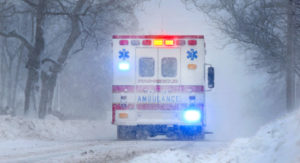 HYANNIS – A hurricane or severe winter storm hits the Cape, ripping down trees and branches, knocking out power, blocking roads and flooding low-lying areas.
HYANNIS – A hurricane or severe winter storm hits the Cape, ripping down trees and branches, knocking out power, blocking roads and flooding low-lying areas.
Well before the storm arrives, officials at Cape Cod Healthcare (CCHC) will have been watching its progress, coordinating with town, county and state government agencies, as well as utilities, suppliers and contractors, planning what steps to be taken and when.
“We were watching Florence,” said Michael Bachstein, executive director of facilities and support services, but the destructive Aug. 31, 2018, hurricane went west toward the Carolinas, not north. “But anytime, things can change,” he said.
Once forecasts for a major winter storm or a tropical depression start to show it may affect Massachusetts, CCHC officials pay attention.
“As we get closer, we have more coordination meetings,” Bachstein said.
In advance of a major storm, diesel tanks for Cape Cod Hospital’s three generators are topped off and anything outdoors that might be blown away, such as construction scaffolding, is taken down or secured, said Frank Riccio, director of security, safety and emergency preparedness. Similar steps are taken at Falmouth Hospital, the system’s urgent care clinics in Harwich, Hyannis, Sandwich and Falmouth; the JML Care Center in Falmouth; and Heritage at Falmouth, a retirement facility. Hospital patients that can be safely discharged are sent home, and elective surgeries postponed.
“That’s something we do at the 11th hour,” Riccio said, adding that the hospital does everything it can to maintain important patient services, such as radiation therapy for cancer patients, or long-scheduled operations.
Coordination Is Essential
Cape Cod Healthcare officials plan and direct their emergency response with local agencies via the Barnstable County Multi-Agency Coordination Center, as well as contacts with the Massachusetts Emergency Management Agency and the state Department of Public Health and Department of Transportation. Cape Cod Hospital also has agreements with Eversource for electricity, and suppliers of fuel, food, medicine and laundry services to meet its needs during a catastrophic storm.
“As the storm gets closer, we start preparing the staff,” Bachstein said.
Everyone on staff – not just nurses and doctors – are essential to keep the hospital running, Riccio said, and they may have to stay on-site for several days. Drivers with four-wheel drive vehicles provide rides to and from the hospital to workers who need transportation, especially when snow from winter storms makes roads hazardous.
“We spend a lot of time and energy making sure they are safe,” Bachstein said.
“We set up sleeping accommodations,” Riccio said. “We don’t send them out in a blizzard.”
Access to the hospital takes priority, and private plows are hired to keep Bayview Street clear, he added.
Though emergency shelters exist to which patients could be discharged, Riccio said the hospital has in the past converted some of its spaces into temporary shelters for patients who could not be discharged home, due to loss of power at their homes.
“Some elderly folks might be able to manage at home,” he said, but not if they have no power or heat, or rely upon oxygen generators.
Learning From Each Storm
Through its membership in a consortium of hospitals, Cape Cod Healthcare studies the experience other healthcare facilities have with major storms. It also examines its own history after each Cape storm to see how response could be improved. These analyses have resulted in tweaks to ambulance routes, for example, Riccio said.
The emergency plans get outside review every three years by the Joint Commission, a national non-profit that accredits hospitals and healthcare organizations, Riccio said. Furthermore, the hospital’s insurer regularly inspects facilities and recommends what safety improvements might be made.
To make the hospital less vulnerable to storm damage, its generators are located on the roof, Riccio said. The hospital also has the ability to draw water from both Barnstable and Yarmouth municipal systems, and has two electrical feeds from two separate substations, in case one gets knocked out. Although the hospital stands near Hyannis Harbor and Lewis Bay, it rises uphill from those bodies of water, he said, and is relatively safe from coastal flooding.
“The plan is to make the hospital as resilient as we can,” he said.





















